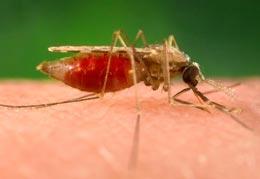 The malaria parasite, carried by mosquitoes, is growing resistant to artemisinin-based drugs.James Gathany / CDC
The malaria parasite, carried by mosquitoes, is growing resistant to artemisinin-based drugs.James Gathany / CDCPosted on 07/29/2009 9:40:12 PM PDT by neverdem
Artemisinin-based medicines fail a growing number of patients in Cambodia.
 The malaria parasite, carried by mosquitoes, is growing resistant to artemisinin-based drugs.James Gathany / CDC
The malaria parasite, carried by mosquitoes, is growing resistant to artemisinin-based drugs.James Gathany / CDCMalaria parasites in Cambodia are becoming increasingly resistant to the drug hailed as the world's best chance to eradicate the disease.
Artemisinin-based drugs are currently the best weapon against malaria, a disease which kills around a million people every year and is spread by mosquitoes carrying malaria parasites such as Plasmodium falciparum. These parasites have already developed resistance to drugs such as chloroquine and sulfadoxine-pyrimethamine, once the front line against the disease, so hopes have been pinned on artemisinin-combination therapies (ACTs).
The parasites have become far less easy to treat with ACTs, however, in the Cambodian city of Pailin, close to the country's western border with Thailand. The finding was made by researchers from the Wellcome Trust–Mahidol University Oxford Tropical Medicine Research Programme, based in Bangkok, Thailand.
In particular, the parasites are becoming more resistant to a combined therapy of artesunate, derived from artemisinin, and mefloquine, a quinine analogue. This combination is used to treat malaria worldwide.
Rumours about artemisinin resistance in Cambodia have been circulating for a number of years, and a relatively small study by Harald Noedl at the Medical University of Vienna and his colleagues, published late last year, suggested that resistance was emerging1.
The latest study involved 40 patients infected with P. falciparum in Pailin, and another 40 in Wang Pha, in northwest Thailand2. Half of each group were given just artesunate, and the other half the dual artesunate–mefloquine therapy.
“This is a wake-up call”
Nick Day
Mahidol Oxford research unit, Bangkok
The Cambodian group took almost twice as long to clear the parasite from their body as the Thai group: 84 hours compared with 48 hours. Usually artemisinin drugs clear the parasite within three days, says Nick Day, director of the Mahidol Oxford research unit in Bangkok and co-author of the study, published in the New England Journal of Medicine.
Infection broke out again for six of the twenty patients taking just artesunate in Cambodia, compared with two patients in Thailand. With the combined therapy, it recurred in only one of the twenty cases in each group.
The World Health Organization recommends that artemisinin-based drugs be given only in combination, to delay the onset of resistance. But Day explains that the single-dose groups were crucial in their controlled study to show that there was growing resistance to artesunate, and not to mefloquine alone.
The emergence of artemisinin-resistant malaria in Cambodia is especially worrying, because previous drug-resistant strains of malaria have sprung from there. "This is a wake-up call," says Day. "We have got reduced susceptibility to the drugs in an area where we've seen resistance emerge before." Given time, the parasite will only become more resistant to the drugs, he adds.
The research offers a clear warning that efforts to eradicate malaria should be accelerated, says Sanjeev Krishna from St George's University of London, who studies the biochemical origins of artemisinin resistance. He says that he expected resistance to occur eventually — but not as soon as this. "I thought we would have had longer," he says. More intensive drug-development programmes are needed, he adds, to find new drugs based on artemisinin, as well as alternatives.
An eradication programme combining continued treatment and use of mosquito nets is under way in this area of Cambodia, Day says. "It's going to need considerable political willpower, scientific research and financial resources to achieve," he cautions. But without it, there is a danger that the resistant parasite could reach the world's malaria heartland — Africa. "That," says Day, "would be a major disaster."
Thanks for the link.
Disclaimer: Opinions posted on Free Republic are those of the individual posters and do not necessarily represent the opinion of Free Republic or its management. All materials posted herein are protected by copyright law and the exemption for fair use of copyrighted works.